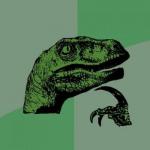I've gotta argue against a couple of claims there. Firstly, some primates do eat meat, this is true- but they do not eat it to the extent that humans do, and our earliest ancestors were herbivorous. So at some point, they evolved to the point where they could eat meat, and obviously they didn't have meat to get there. We have very long colons, digestive tracts, relatively flat teeth, and an inability to survive well solely on meat. I am not aware of any evidence that pre-humans ate meat to the extent humans do to lead to early humanity, or attribute it heavily to that, as nothing about our digestion points to meat being a particularly good idea, especially when we don't digest it *well*. I'm speaking of early humanity when I accredit hunting, not pre-humanity. Secondly, your claim that meat is more calorie dense. It depends on which vegetation you compare it to. There are 1,537 calories in a pound of black beans. There are only 1,137 calories in a pound of meat. And that's 15% fat 85% lean meat of today, not the leaner meat of early domesticated or wild animals. As opposed to 404 calories in a pound of bananas. Although fruit back then- it's hard to know what kinds of calories it would have. It might have been more calorie dense, because it would have been picked at ripeness, not picked weeks early, put in an ethylene gas chamber to force ripening for transport, etc. lol. BUT today's fruits are freaks of breeding, same as the animals. They're sweeter today than they were (or so we're told), so more sugar now than then.
 Caption this Meme
Caption this Meme